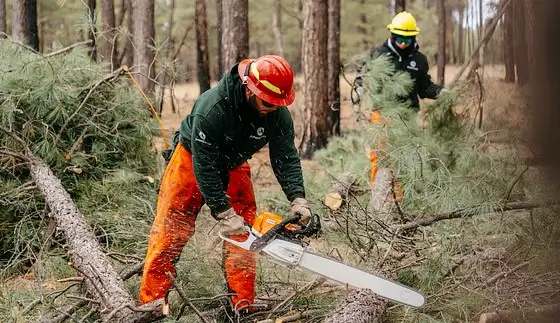The first cohort of 72 AmeriCorps NCCC Forest Corps members has completed their service, marking a significant milestone in wildland fire prevention and restoration efforts across nine states.
These members contributed over 115,000 hours to projects focused on reforestation and wildland fire mitigation, enhancing national forest health and community safety.
Program Overview
The AmeriCorps NCCC Forest Corps program is a collaborative initiative with the U.S. Department of Agriculture’s Forest Service.
It aims to engage young adults in meaningful community service projects that focus on environmental conservation and disaster response within the United States.
Forest Corps members received specialized training and certifications in wildland firefighting. This training equips them with essential skills to contribute effectively to national forest health and ensure community safety through various conservation efforts.
Contributions to Environmental Conservation
The completion of over 115,000 service hours by the Forest Corps members underscores their dedication to preserving natural resources.
Their work in reforestation and wildfire mitigation plays a crucial role in maintaining healthy ecosystems and protecting communities from potential wildfire threats.
Ken Goodson, Director, AmeriCorps NCCC said,
“The first cohort of AmeriCorps NCCC Forest Corps members has impressed us all with their dedication and flexibility. These teams earned chainsaw certifications, learned to dig fire lines, and managed prescribed burns, which will keep communities safe for decades.
They responded to active wildfires, immediately protecting local lands and communities, and nurtured young nursery trees to support national reforestation efforts. Through harsh weather and logistical challenges, they remained agile and passionate.
These young people will graduate as 72 trained wildland firefighters, ready to contribute meaningfully to preserving our nation’s natural resources. We are proud of everything they’ve accomplished in the past nine months, together with our outstanding partners in national forests around the nation.”
Economic Impacts
- Enhancing forest resilience supports local economies reliant on forestry and tourism.
- Reducing wildfire risks can lead to long-term economic benefits for affected regions.
- The program fosters career development opportunities in environmental management fields.
Actual Hands on Experiences
During their tenure, members of six Forest Corps teams responded to active wildfires in addition to their planned projects.
In order to protect communities and strengthen forests, AmeriCorps NCCC Forest Corps members got practical training on how to respond to wildland fire disasters and address wildfire hazards.
Many will continue to develop their abilities by pursuing employment combating wildland fires. Seventeen program participants plan to pursue disaster response or fire mitigation careers upon graduation.
Personal Growth and Career Development
Participants like Lauren Panozzo have shared how the program has shaped their personal growth. The experience has provided them with valuable skills, fostering aspirations for careers in wildland firefighting and environmental management.
“Forest Corps was a once-in-a-lifetime experience that has shaped me into a kinder, stronger, more resilient, and patient woman… I want to do whatever I can to protect and preserve them for others to appreciate.”
– Lauren Panozzo, AmeriCorps NCCC Forest Corps alumna.
Additional Reading
Final Thoughts
The AmeriCorps NCCC Forest Corps program exemplifies how strategic partnerships can address critical environmental challenges while providing young Americans with valuable skills.
As these initiatives continue, they promise lasting benefits for both ecological preservation and economic stability across participating regions.
Sources: AmeriCorps, and U.S. Department of Agriculture’s Forest Service.
Ivan Alexander Golden, Founder of THX News™, an independent news organization dedicated to providing insightful analysis on current events, prepared this article.









